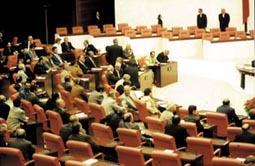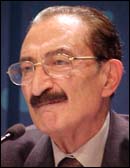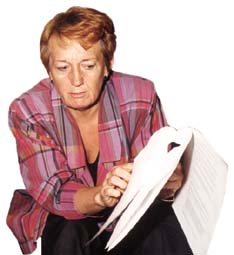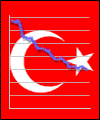25
June 2002
![]()
2. "Kurds wary of regional rivalry", Iraqi Kurds, are worried that regional rivalry may shatter their dream of maintaining control over their semi-independent enclave in northern Iraq.
3. "Dissident MPs ask ailing Turkish prime minister to call it quits", Turkey's ailing Prime Minister Bulent Ecevit faced calls for the first time Tuesday from dissident MPs in his own party to resign in a bid to end the political turmoil in the country.
4. "Top court to discuss cancellation demand for media law", the Constitutional Court will today discuss a demand from a total of 119 lawmakers from different parties having seats in Parliament, who applied to the top court last week for the partial cancellation of the controversial media law, publicly known as the Supreme Board of Radio and Television (RTUK) Law.
5. "Fogg: 'Don't give up implemntig Copenhagen Criteria due to fear of PKK exploitation", European Union Turkish Representative Karen Fogg, whose duty in Ankara is nearing its close, visited Nationalist Action Party (MHP) leader Devlet Bahceli yesterday at his office. During their meeting, Bahceli stated that the Copenhagen criteria were compatible with the aims of PKK.
6. "Turkish trade deficit drops
by 14.6 percent in first four months of 2002", Turkey's
trade deficit shrank by 14.6 percent in the first four months of the
year to 3.329 billion dollars from 3.898 billion in the same period
last year, the state statistic institute said on Monday.
1. - AFP - "Lack of opposition support delays death penalty abolition in Turkey":
ANKARA / 24 June 2002
Turkey's ailing Prime Minister Bulent Ecevit said Monday that he
had so far failed to win over the opposition to his bid to abolish the
death penalty, deferring until October the EU-required reform that has
deadlocked his three-party coalition. "We have not yet been able
to reach consensus with the opposition on EU-related issues," Ecevit,
77, said in a written statement from his sickbed. Ecevit's Democractic
Left Party (DSP) had been in talks with the three opposition parties
in parliament since last week to persuade them to back key democracy
refoms such as sacrapping the death penalty and legalizing education
and broadcasts in the Kurdish language.
The talks were launched after the government's far-right wing, the Nationalist Action Party (MHP), could not be budged from its resistance to the change, but allowed its two partners to seek a one-off alliance with the opposition on the death penalty abolition. The lack of an agreement with the opposition automatically postpones any progress on the reforms as the Turkish parliament is scheduled on Friday to go into summer recess that will last until October 1.
Nonetheless, Ecevit remained upbeat that the DSP's ongoing talks with the opposition could yield a consensus since EU membership was a national target adopted by all parties. "If there is an agreement with the opposition, we might consider summoning lawmakers back from recess for an extraordinary session," the prime minister said.
Turkey, an EU candidate since 1999, wants the European Union to set a date for the opening of accession talks by the end of the year. But it has been clearly told by its European partners that it needs to catch up with the Union's political criteria before it can sit down at the negotiating table. Turkey has had a moritorium on judicial killings since 1984, and in October last year amended the constitution to outlaw executions except in wartime or for terrorism.
But the EU has insisted that Ankara completely ban the death penalty and also allow schools to teach in the Kurdish language. The government disputes on EU refoms, coupled with Ecevit's health, has led to mounting concers that the country risks political and economic turmoil. Ecevit has been away from his office for more than a month with a long list of ailments, and is poised to undergo a comprehensine check-up on June 27, after which doctors will decide when he can resume his duties.
"I will go back to work as immediately if doctors
give a favourable view this week. I am looking forward to such a prospect,"
the prime minister said. ![]()
2. - Iraq Press - "Kurds wary of regional rivalry":
24 June 2002
Iraqi Kurds, are worried that regional rivalry may shatter their
dream of maintaining control over their semi-independent enclave in
northern Iraq.
Their major concern is Turkey which has been shifting alliances recently and openly changing its goal posts regarding the future of Iraqi Kurdistan, according to a senior Iraqi Kurdish personality.
Dawood al-Daghestani warned in remarks published in major Kurdish newspapers that regional powers were on the move to put an end to the status-quo in Iraqi Kurdistan.
He said these countries, particularly Turkey, seemed to be determined to use "political and military means to achieve this end."
Though al-Daghestani holds no political position in Iraqi Kurdistan, his views are widely respected by the region's various factions due to his post as the head of a commission monitoring human rights in the region.
He openly accused Turkey of conducting an intensive media campaign against the current situation in Iraqi Kurdistan. He said the Turks were even trying to push the region to the brink of war by supporting one party against the other.
He cited the latest rapprochement between Ankara and the Patriotic Union of Kurdistan, a major political and military faction which shares control of the region with Kurdistan Democratic Party.
He charged that Ankara has put the PUK under great pressure to attack its opponents in the region, namely members of the former Kurdistan Workers Party or PKK which has several thousand combatants in areas under PUK control.
The region is protected by an allied air power based in Turkey. The United States, which has made the toppling of President Saddam Hussein's regime a top priority, is contemplating the use of the Kurdish territory and the Kurdish rebels as a spring board for attacks on Saddam.
But the U.S. policy of overthrowing Saddam has added further strategic significance to Turkey, without whose support the Americans may find it impossible to march against Sadddam.
For this reason, according to al-Daghestani, the Turks are plotting to "have a piece of the pie" before even the U.S. moves against Saddam.
He said the Turks want to establish their control of the Iraqi oil center of Kirkuk and Mosul on the pretext of protecting a small Turkoman minority.
Al-Daghestani said the Turks were considering sending troops deep into Iraqi territory even before the start of the much-trumpeted American military campaign against Saddam.
The comments mark a shift in Kurdish attitude and rhetoric which has so far tried to appease Ankara. They also show how frustrated the Kurds have become with their neighbors who throughout history have exploited their cause to meet their own interests.
Al-Daghestani said the Turks were determined to expand their borders southwards through military means as a way to provide a cover for their mounting and aggravating domestic problems.
He said he feared that Ankara was coordinating with countries neighboring Iraq to hit the current Kurdish self-rule experiment in the region.
Ankara openly supports Iraqi Turkomans who have found a haven among the Kurds in the north. They have their own militias, financed and armed by Ankara. The Iraqi Turkomans voice support for Turkish policy and have aligned themselves with Ankara.
Al-Daghestani warned of massive emigration from the region if Ankara did not put a halt to its meddling in the region's internal affairs.
Previously, Ankara sent troops into northern Iraq on the pretext of hunting down PKK fighters who taken the region as a refuge. But the PKK has abandoned its policy of armed struggle and violence to achieve its aims and has even changed its name.
Al-Daghestani said there was no reason or pretext for Ankara to interfere in the region's affairs. Asked to comment on his remarks, al-Daghestani told Iraq Press that the current Turkish policy posed a danger not only to Iraqi Kurds but also to neighboring Arab countries.
He said Ankara's policy was drawn by its "all-powerful military establishment" which is not yet ready to accept the idea of Kurds enjoying their political rights.
The way to peace, he said, is for Ankara to recognize
Kurdish rights and limit the role of its military in determining the
country's foreign policy. ![]()
3. - AFP - "Dissident MPs ask ailing Turkish prime minister to call it quits":
ANKARA / 25 June 2002
Turkey's ailing Prime Minister Bulent Ecevit faced calls for the
first time Tuesday from dissident MPs in his own party to resign in
a bid to end the political turmoil in the country. Nine MPs from Ecevit's
Democratic Left Party (DSP) said in a statement that 77-year-old Ecevit's
failing health had not only jeopardized political and economic stability,
but also harmed party unity.
"The party, founded and developed by the Ecevits in self-sacrifice, must from now on continue its life without Ecevit, but under the guidance of the Ecevits," said the statement, read out at a news conference. The wording seemed to suggest that Ecevit should withdraw from active politics, but continue to guide the party as a mentor. "We believe the Ecevits will undertake this historic responsibility," it added. The DSP was set up by Ecevit's wife Rahsan in 1985 and chaperoned by her until 1987 when a public referendum lifted a 10-year-political ban on Ecevit -- and other politicians -- after the 1980 military coup and allowed him to take the helm of the party.
He has been the sole leader since then, with his wife as the party's secretary general, and retains an almost unbreakable one-man rule over the party with no tolerance of dissidents, according to analysts. Ecevit has come under increasing calls from the opposition to step down as a long list of ailments have kept him away from the office since early May. He has brushed them aside on the grounds that such a move would drag the country into uncertainty. Ecevit's ill health has sparked fears that his absence from office could lead to the collapse of his fragile three-way coalition, already plagued by divisions, and trigger early elections.
Political stability is crucial for Turkey as the country
battles an economic crisis with massive loans from the International
Monetary Fund, and while it seeks to boost its struggling bid to join
the European Union. Ecevit is scheduled to undergo a comprehensive medical
check-up on Thursday after which his doctors will decide whether he
can resume his duties or not. ![]()
4. - Turkish Daily News - "Top court to discuss cancellation demand for media law":
ANKARA / 25 June 2002
The Constitutional Court will today discuss a demand from a total
of 119 lawmakers from different parties having seats in Parliament,
who applied to the top court last week for the partial cancellation
of the controversial media law, publicly known as the Supreme Board
of Radio and Television (RTUK) Law.
Lawmakers from main coalition partner, the Democratic Left Party (DSP), senior coalition partner, the Nationalist Movement Party (MHP), the opposition Justice and Development Party (AKP) and the Saadet [happiness or contentment] Party (SP) and independent deputies, are asking the top court to cancel some 13 articles of the media law, which experts believe will hinder freedom of the press and expression and cause further monopolization in the media sector.
The court will also conduct a preliminary investigation into the suit filed by 111 deputies, who applied to the court on the same day for the cancellation of two articles of the same law.
The top court was previously ordered to stop the execution of five articles of the RTUK law upon the application of President Ahmet Necdet Sezer. He vetoed the bill, but as Parliament sent it back to Sezer for his approval, again, he approved it. He later applied to the Constitutional Court for its partial cancellation.
From these five articles, the court has decided to stop
the execution of the article which allows monopolization and media owners
to attend to public tenders, and the article which regulates the election
of board members. ![]()
5. - Milliyet - "Fogg: 'Don't give up implemntig Copenhagen Criteria due to fear of PKK exploitation":
25 June 2002
European Union Turkish Representative Karen Fogg, whose duty in Ankara is nearing its close, visited Nationalist Action Party (MHP) leader Devlet Bahceli yesterday at his office. During their meeting, Bahceli stated that the Copenhagen criteria were compatible with the aims of PKK.
Fogg replied, “Don’t give up implementing the Copenhagen criteria due to fear of PKK exploitation.” The death penalty and Kurdish education and broadcasting were also on the agenda of the meeting.
Fogg said that Turkey didn’t need to deal with these
issues in the immediate future since they are mid-term European Union
accession criteria. ![]()
6. - Reuters - "Turkish trade deficit drops by 14.6 percent in first four months of 2002":
ANKARA / 24 June 2002
Turkey's trade deficit shrank by 14.6 percent in the first four
months of the year to 3.329 billion dollars from 3.898 billion
in the same period last year, the state statistic institute said on Monday.
Imports rose by 0.1 percent to 13.828 billion dollars, while exports increased by 5.9 percent to 10.498 billion dollars, the institute said. In April 2002 alone, imports went up by 32.3 percent to 4.019 billion dollars from 3.037 billion dollars in April last year. The value of exports rose 4.7 percent to 2.738 billion dollars from to 2.616 dollars in April 2001, it said.
Increased exports, driven by the depreciation of the crisis-hit
currency, helped Turkey cut its trade deficit by 65.1 percent to 9.32
billion dollars in 2001. Backed by massive loans from the International
Monetary Fund (IMF), the country has been battling one of its worst
ever recessions since February 2001. ![]()